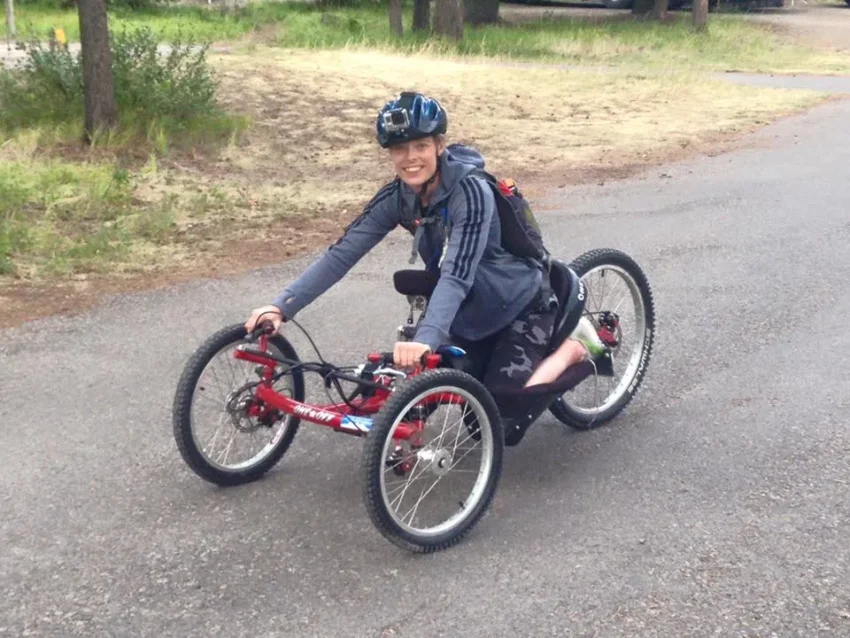Written by Alex Brown, Prosperity Saskatchewan, Sep 25, 2024
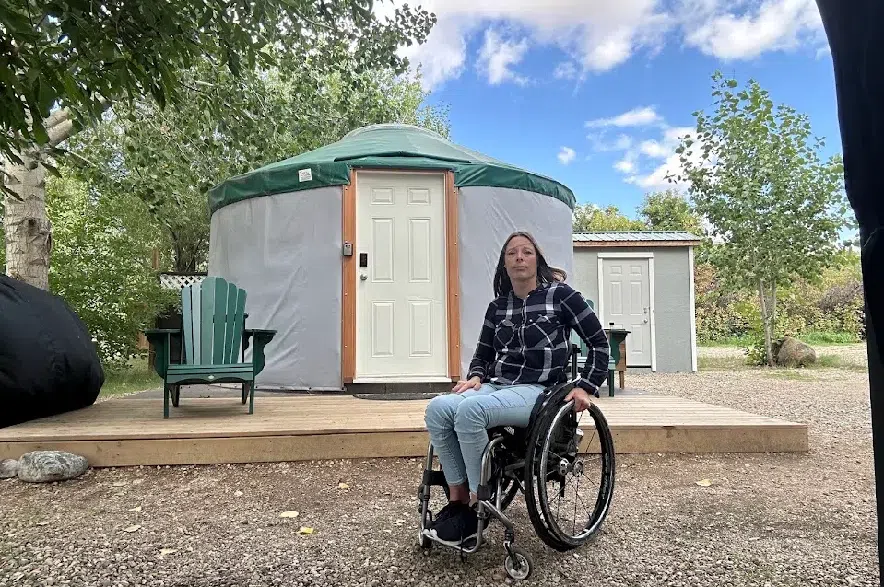
Canadian Paralympic medalist Lisa Franks, outside an inaccessible “Camp-Easy” yurt in Blackstrap Provincial Park. (Submitted)
Saskatchewan is filled with beautiful landscapes and bodies of water to explore and enjoy.
But for those with a disability, it’s not always that simple.
According to Statistics Canada’s 2021 Census, 27.7 per cent of Canada’s adult population is living with a disability. One of them is Canadian Paralympic athlete and accessibility advocate Lisa Franks.
“I have a spinal cord injury, but that didn’t affect my desire to explore,” the six-time gold medalist explained. “That didn’t affect my want to be independent and do things that are my own.”
READ MORE:
- ‘It’s an extension of my body’: accessibility advocates say airlines need to change
- Disabled hunter pushing for more accessible hunting rules
- Katepwa Point’s new accessible dock allows everyone to enjoy the lake
At the age of 14, a cluster of blood vessels burst in Franks’ spinal cord, leaving her paralyzed from the neck down. She slowly regained the use of her arms and began to adapt to her new life using a wheelchair.
“When I was younger, I never wanted to draw attention to myself. I never wanted to show that I had these needs of accessibility. I just wanted to be under the radar,” recalled Franks.
“But the older I get, I’ve realized these are our rights.”
An eye-opening trip up north
In 2022, Franks said she embarked on a trip to La Ronge Provincial Park, to assess the adaptive mountain bike trails.
“I wanted to stay at a provincial park, and I ran into barrier after barrier,” said Franks.
“I couldn’t even register for my campground, because the registration kiosk was up a step. I couldn’t shower, as there was not an accessible shower at the Nut Point Campground.”
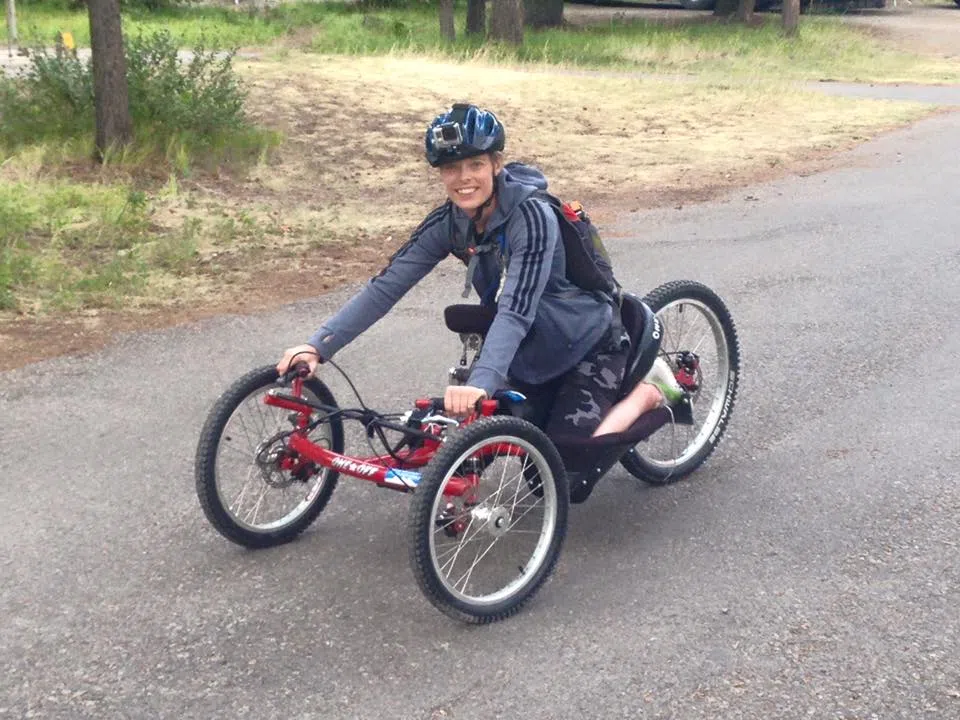
Lisa Franks uses an adaptive mountain bike to explore trails around the world. (Submitted)
“I thought, ‘You know, I should address these issues with somebody that would have some power.’ So I went to the provincial park office to speak to the park manager, and the park office was not accessible. It was just built within the last few years, and it was down in a basement. I couldn’t even have a conversation with a person that could, hopefully, make a difference,” Franks remembered.
Disappointed with the experience, but undeterred, Franks said she decided to explore more of Saskatchewan’s provincial parks, hoping for accessible accommodations.
“I’ve been exploring more of our parks, and I’ve just found more barriers. And it’s almost as if (the province) is not even addressing them, and they’re not being proactive. It’s just like they’re being reactive to complaints,” Franks said while staying in her accessible camper van at Blackstrap Provincial Park.
Franks decided to file a complaint with the Saskatchewan Human Rights Commission about her initial trip to La Ronge. Since then, she’s compiled a nine-page document detailing other barriers that she’s encountered in Saskatchewan’s provincial parks.
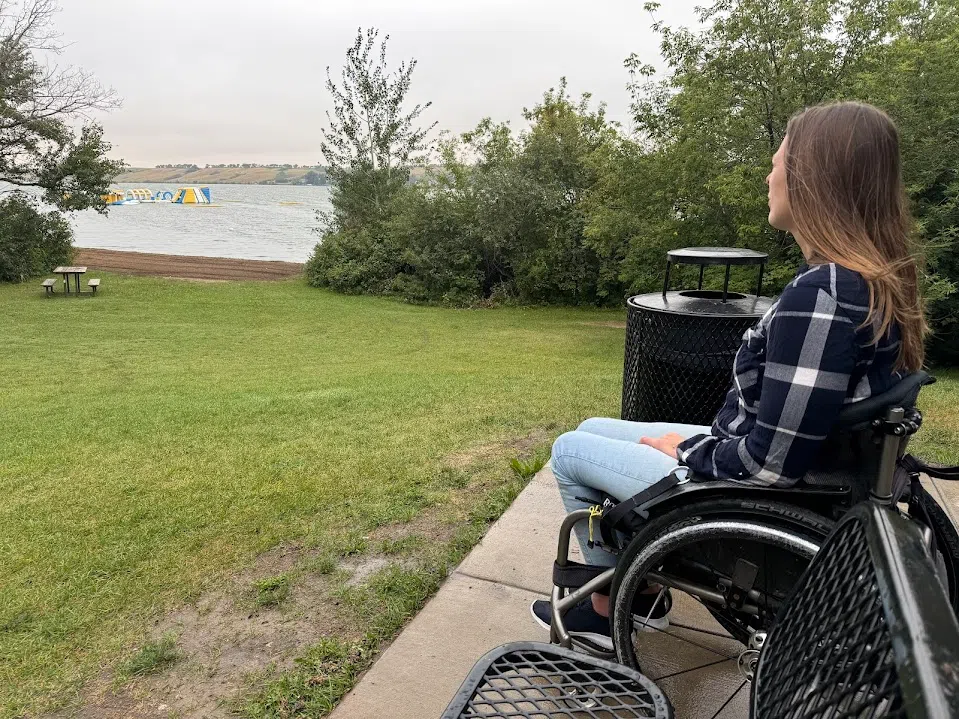
Gazing out at Blackstrap Lake, Lisa Franks is disappointed with the lack of accessibility in Saskatchewan’s provincial parks. (Alex Brown/650 CKOM)
Accessibility barriers
While Franks couldn’t speak to the mediation or investigative process for her complaint, she said she’s frustrated with the lack of representation within Saskatchewan Parks and wants the organization to have someone with lived experience working to implement changes for disabled visitors.
She drove to Katepwa Point Provincial Park shortly after the announcement of the installation of a new, accessible dock.
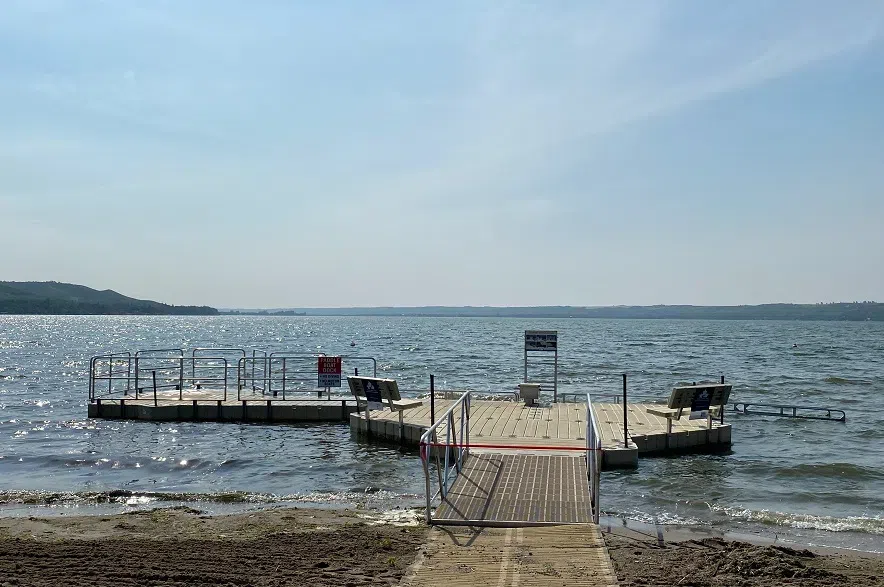
The new dock features a gently sloping ramp, non-slip surfaces, and a specialized transfer system that allows for seamless access from a wheelchair to a paddle boat, kayak, or canoe. (Roman Hayter/980 CJME)
“We are incredibly proud to open this accessible dock, which provides an opportunity for people of all ages and abilities to experience the joy of being on the water,” Travis Keisig, MLA for Last Mountain-Touchwood, said in a news release.
Franks said despite the dock looking impressive, it isn’t practical.
“When I went to actually use it, the combination of the soft sand under the beach mat and the slope of the beach, I couldn’t actually wheel up and I couldn’t actually cross it properly,” Franks explained, frustrated.
“It just goes to show how meaningful it is to have somebody actually test it out and use it, instead of following a checklist and saying ‘Yeah it looks good,’ but in reality, it doesn’t function properly.”
The cost for the project was $88,000, which was made possible through a combination of provincial funding and contributions from community partners, including the Saskatchewan Trails Association and Trans Canada Trail.
Franks also takes issue with Sask. Parks’ “Camp-Easy Yurts,” which are hand-crafted structures which can sleep up to six people.
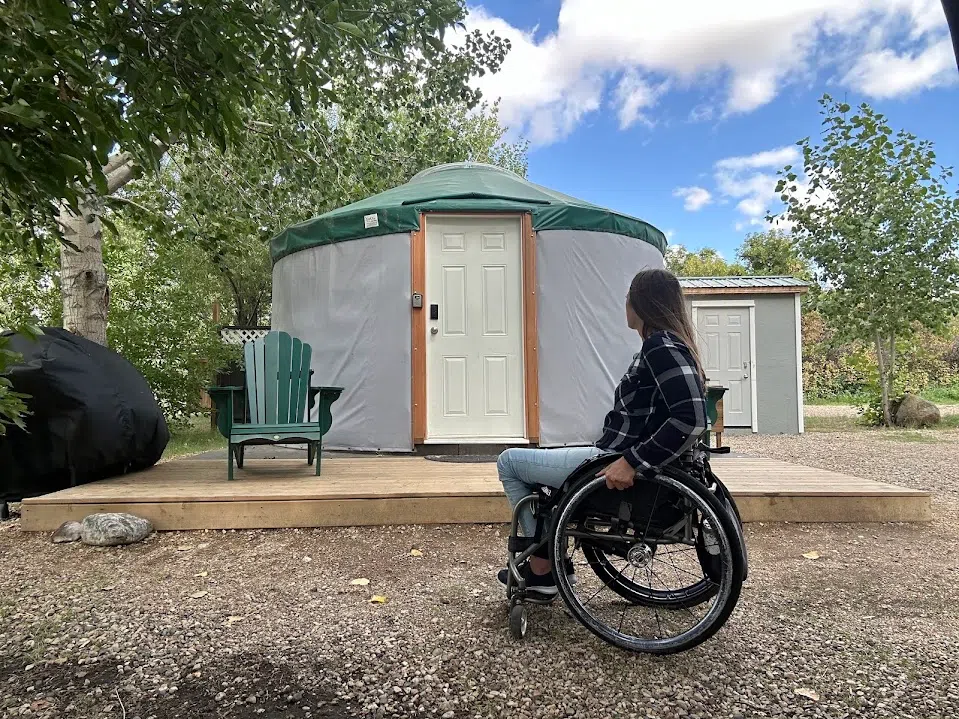
“It’s a great thing for people that might not be able to set up a tent or a trailer, (but) none of them are accessible. I’ve visited four parks within our province, haven’t seen an accessible one,” remarked Franks. (Submitted)
The yurts feature queen-sized beds, bunk-style cots, a raised wood floor and an outdoor picnic area.
“It’s a great thing for people that might not be able to set up a tent or a trailer, (but) none of them are accessible. I’ve visited four parks within our province, haven’t seen an accessible one,” remarked Franks.
“There’s a step up to the patio and then a step into the entrance,” she explained. “It’s incredibly disappointing to find that in 2024 – you know, these were all built within the last five years – that the province isn’t considering accessibility.”
According to the Government of Saskatchewan’s website, there is a broader initiative underway to improve accessibility throughout provincial parks, with future plans including upgraded pathways, additional seating areas, and enhanced signs.
“Whether it’s a day at the lake, spending time in nature, or camping out under the stars, we want our provincial parks to be accessible and welcoming for everyone,” Laura Ross, Saskatchewan’s parks, culture and sports minister, said in a release issued last year.
“As we replace or build new facilities, we always look at how to remove barriers and create a more inclusive environment, so that everyone can have fun in our parks and enjoy time outdoors.”
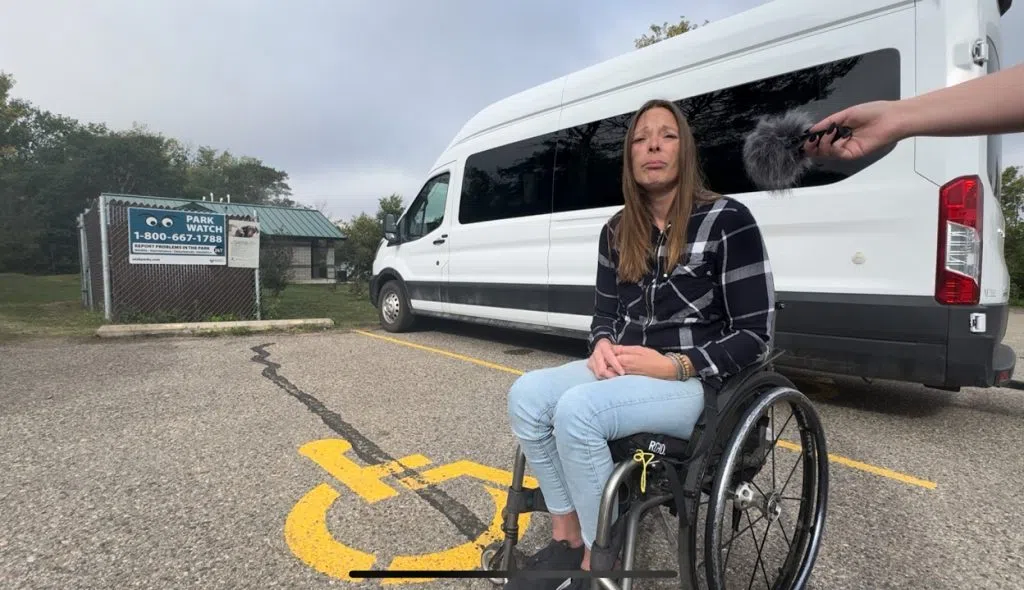
Accessible parking spots with proper signage and spacing are one accommodation Lisa Franks would like to see in provincial parks. (Alex Brown/650 CKOM)
“One thing people don’t realize is that sometimes, the cost of making something accessible is negligible, especially when it’s done right from the beginning,” Franks said.
“These Camp-Easy Yurts, as an example – if that had been designed properly right from the start, it wouldn’t have cost anything more to make it accessible. But now the province would have to go back and spend thousands of our taxpayer’s dollars to retrofit it to make it accessible.”
Franks said the missing piece is not having a position within Sask. Parks dedicated to accessibility advocacy.
“If you’re gonna build an amenity, you’re gonna have engineers, architects, plumbers, and electricians involved. If you actually, truly want to make it accessible, you need somebody with an accessibility background that can look into that as well,” she explained.
“I would love to see somebody within the parks that is there just for accessibility. They’re there to look at new builds, to look at what is there in place, and see how it can be improved, and see how the user experience is.”
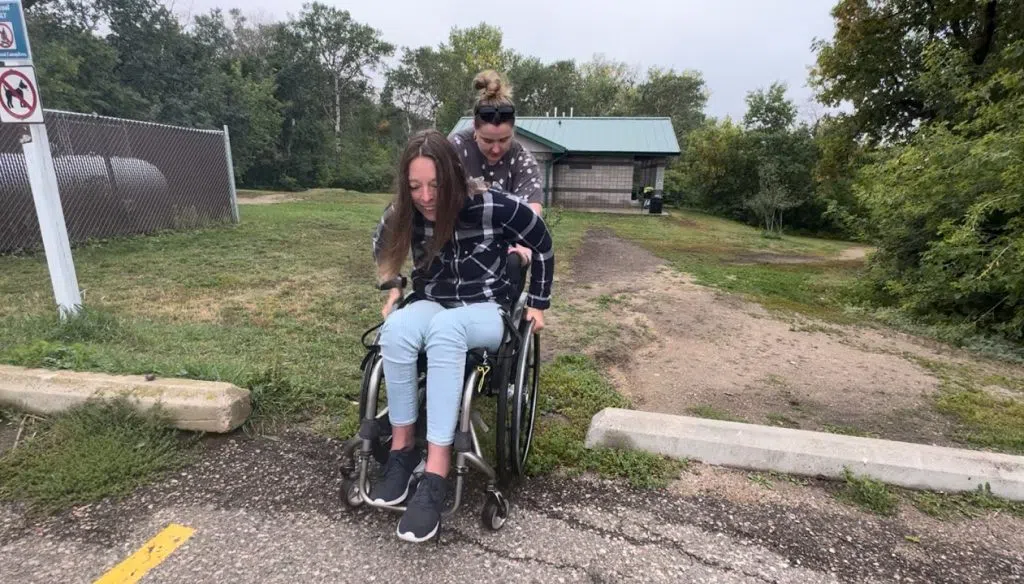
650 CKOM’s Brittany Caffet aids Lisa Franks in wheeling over an unpaved trail in Blackstrap Provincial Park. (Alex Brown/650 CKOM)
Other places doing a better job of accessibility
While Franks is a born-and-raised Saskatchewanian, she spends her days traveling North America in her accessible camper van, driving across Canada during the summers and spending the winters in California.
“The U.S. has the advantage. They have the (The Americans with Disabilities Act),” Franks said.
“We’re getting there with Canada, but it just seems like there’s a lot more thought into accessibility there.”
Much of Franks’ travels have been in British Columbia, with her adaptive mountain bike.
“I’ve had friends in B.C. who were hired by B.C. Parks because they had a mobility issue,” she recalled.
“They had them go and tell what their experience was like in the park. They were able to showcase some of the barriers that were addressed afterward, and we just don’t have anything like that here in Saskatchewan.”
She said parks in B.C. also offer discounts to those with a disability or a low income.
“I think that helps take the sting out of it when you do encounter a barrier, at least being acknowledged with some sort of discount,” Franks said.
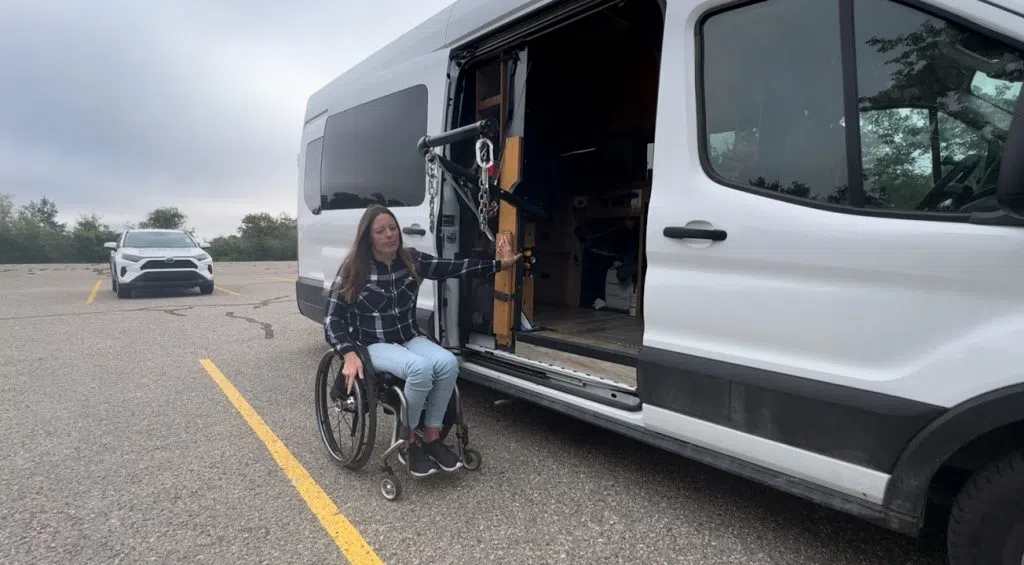
Lisa Franks using the wheelchair lift in her accessible camper van. (Alex Brown/650 CKOM)
Franks said she’d like to see a disability discount implemented at Saskatchewan Provincial Parks as well.
“Seniors get into parks for free. I can go to a park, but I can’t access a lot of the pathways, the beaches, the showers, even, but I still have to pay full price. Where’s the fairness in that?” she asked.
Accessibility in the modern age
In 2024, Franks said we are in an advanced era for accessibility accommodations.
“I’m so glad to be living in this day and age with a disability, because there’s off-road hiking wheelchairs, there’s adaptive mountain bikes, there’s beach wheelchairs. All these things that make it possible for me to explore in the outdoors,” Franks said with a smile.
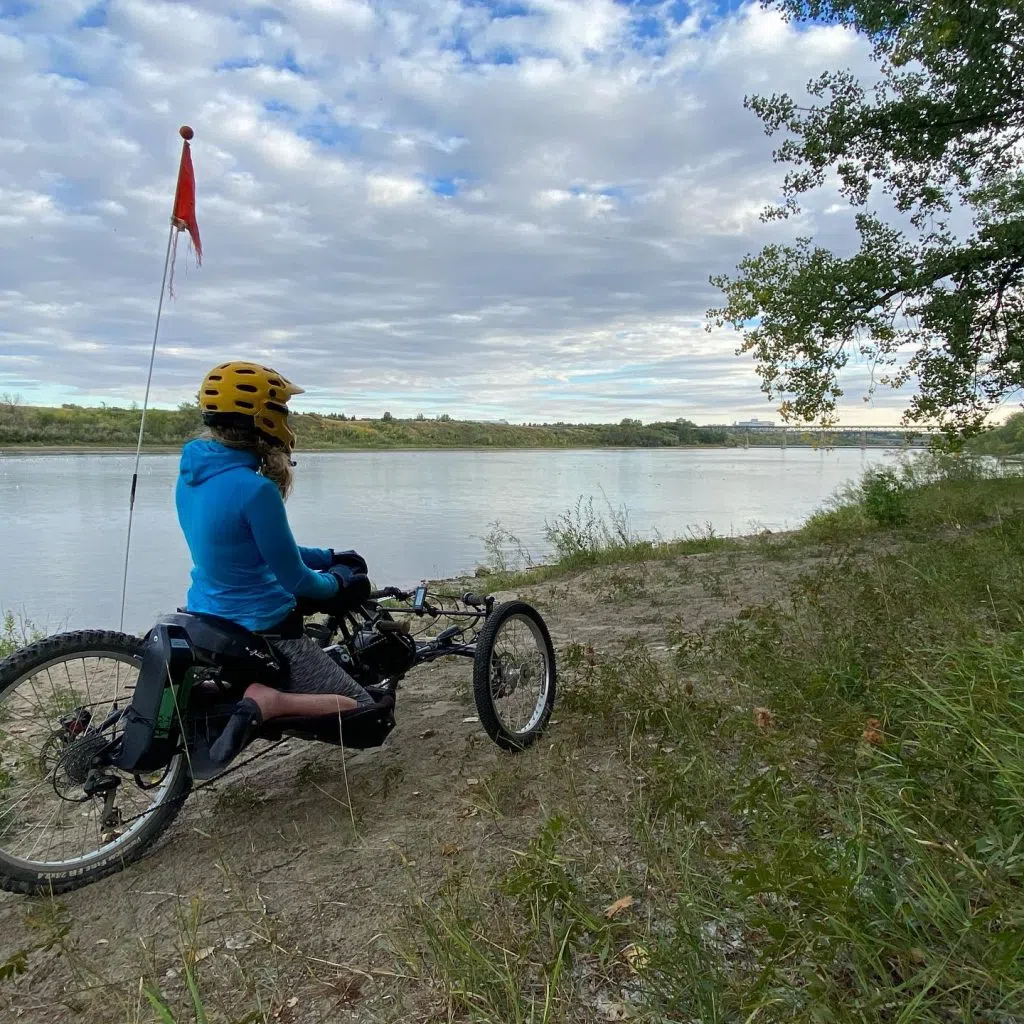
“Just being outside in nature is healing,” said Franks. “When I’m outside, when I’m exercising, when I’m exploring, my mental health and physical health is so much better.” (Submitted)
But the latest accommodations and inventions have only really begun to hit the mainstream market in the past decade.
“Just being outside in nature is healing,” said Franks. “When I’m outside, when I’m exercising, when I’m exploring, my mental health and physical health is so much better.”
She said the majority of the population doesn’t understand the depth of the barriers that people with a disability can face.
“I think a lot of people with disabilities are afraid to go out and do things because they’ve already faced barriers. It’s so intimidating to try and be that person to go out and do something new,” Franks explained.
“Imagine that all of a sudden now you have a disability. Would that affect you? Would you still be able to do the things that you’re doing? Because the world really isn’t built for you anymore.”
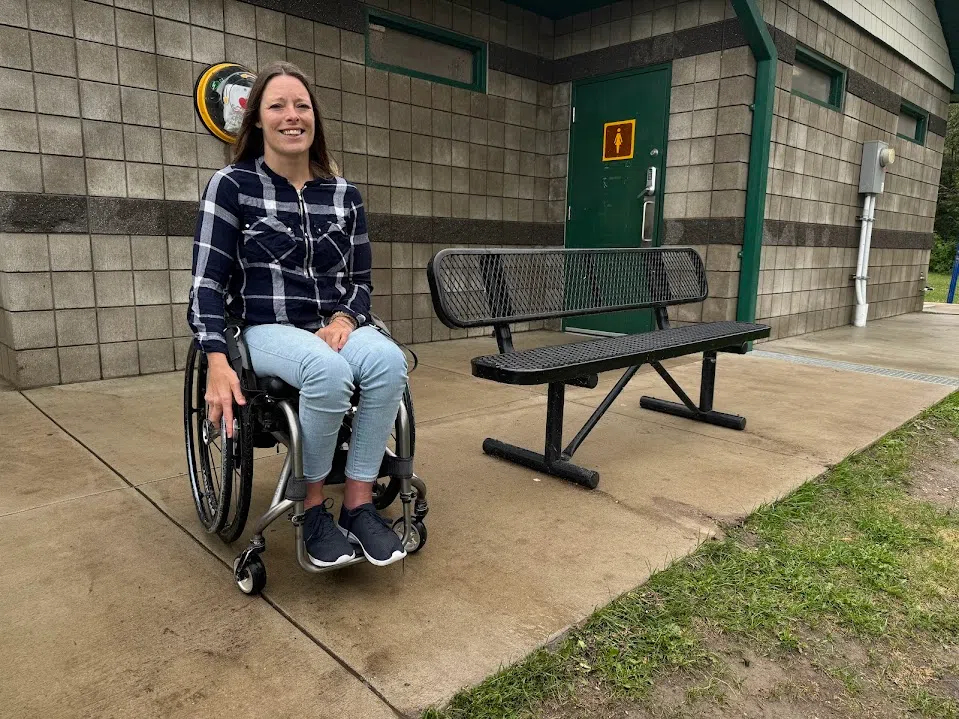
“The world really isn’t built for you,” says Franks, disappointed in accessibility in Saskatchewan provincial parks. (Alex Brown/650 CKOM)
Organizations like The Rick Hansen Foundation are working to “deliver innovative solutions that accelerate a global movement to remove barriers to inclusion for people with disabilities.”
Franks is certified through the foundation to perform assessments on accessibility and also has nearly three decades of lived experience. She said if the Government of Saskatchewan or Sask Parks asked her to consult on park accessibility, she would take the opportunity.
“I love to improve accessibility and it would be a dream job of mine if it was with the right fit,” Franks said.
“I’m from Saskatchewan, I’m proud to be from Saskatchewan. I want to be able to explore my own backyard, and I want to help others to do that and show them there are opportunities. You don’t have to be afraid of getting out there. I just want to make it easier for people to explore.”
Government’s response
In a statement from The Ministry of Parks, Culture and Sport, they are committed to increasing accessibility.
“All new government operated facilities built in parks meet or exceed accessibility standards, and work is also being done to improve existing infrastructure and other park amenities.” In the examples provided by the ministry, they highlighted “a new accessible service centre and campsites at Blackstrap Provincial Park, a new accessible dock at Katepwa Lake.”
The ministry also said they are working on an “accessibility plan that will guide us into the future and contribute to The Accessible Saskatchewan Act adopted.”
